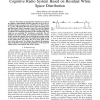Free Online Productivity Tools
i2Speak
i2Symbol
i2OCR
iTex2Img
iWeb2Print
iWeb2Shot
i2Type
iPdf2Split
iPdf2Merge
i2Bopomofo
i2Arabic
i2Style
i2Image
i2PDF
iLatex2Rtf
Sci2ools
132
click to vote
PIMRC
2010
IEEE
2010
IEEE
Opportunistic channel access scheme for cognitive radio system based on residual white space distribution
We propose an opportunistic channel access scheme for cognitive radio-enabled secondary networks. In our work, we model the channel occupancy due to Primary User (PU) activity as a 2-state Alternating Renewal Process, with alternating busy and idle periods. Once a Secondary Node (SN) senses the channel idle, the proposed scheme uses the residual idle time distribution to estimate the transmission duration in the remaining idle time, subject to an acceptable PU interference constraint. The SN transmits the frames within the transmission duration without further sensing the channel, thereby reducing the average sensing overhead per transmitted frame. The analytical formulation used by the scheme does not require the SN to keep track of the start of the idle period. We validate the analytical formulations using simulations, and compare the performance of the proposed scheme with a Listen-Before-Talk (LBT) scheme.
Related Content
| Added | 14 Feb 2011 |
| Updated | 14 Feb 2011 |
| Type | Journal |
| Year | 2010 |
| Where | PIMRC |
| Authors | Manuj Sharma, Anirudha Sahoo |
Comments (0)

